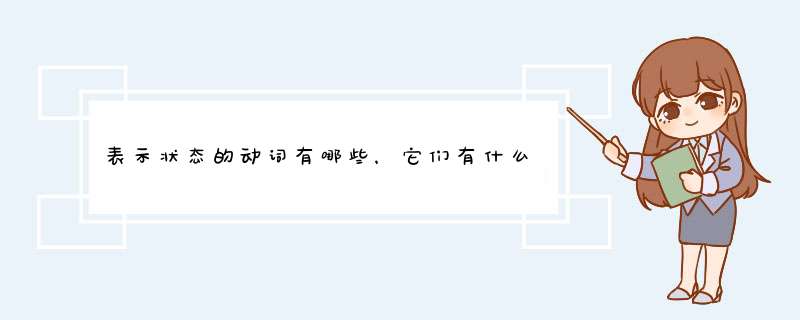
状态动词一般不用于进行时。状态动词可分为四类:
1 动词be(是)和动词have(有)。例如:
The boy is 150 centimeters tall 这个男孩150厘米高。
My husband has several shirts of different colors 我丈夫有好几件颜色不同的衬衫。而不可以说:The boy is being 150 centimeters tall My husband is having several shirts of different colors
2 含有状态动词be和have的意义的动词,如:belong to, contain, differ from, matter, own等。这类状态动词通常都不可以用于进行时。例如:
That dictionary belongs to me 那本字典是属于我的。不能说:That dictionary is belonging to me.
3 表示五官感觉的动词,如 hear, see, feel, taste, smell等。例如:
The old man doesn’t hear very well.那位老人听觉不太好。 不能说The old man isn’t hearing very well.
The meat tastes delicious 这肉味道真好。但不可以说:The meat is tasting delicious
4 表示心理或情感状态的动词,如 believe, consider, expect, imagine, regret,remember等。这类动词通常也都不用于进行时。例如:
He does not believe in Howard’s honesty 他不相信霍华德为人真诚。不能说He is not believing in Howard’s honesty
注意:某些状态动词也可指代动作,在此情况下,状态动词可用进行时。 例如:
The girl is feeling the pot 那个女孩在摸那个壶。
Subject +Link Verb + Adjective+ Verb Infinitive
(一) 形容词句式:Adjective Syntactic Construction
主体性状形容词:描述语法主语所对应现实中性状及属性
(EAC)Entity Attribute Construction
主语+(表示喜怒哀乐情绪心理状态形容词)+to do
afraid, angry , ashamed, furious , content, happy, glad, indignant, sad , sorry , thankful, unhappy , amazed, annoyed, astonished astounded ; bored, delighted, depressed, disappointed ;discouraged, disgusted; distressed embarrassed enraged, excited; frightened, frustrated puzzled, relieved;
Satisfied, shocked ,stunned, surprised ; horrified , worried, terrified
(1):Mary is excited to be here
(表主语喜怒哀乐心理状态,语法主语做不定式逻辑主语)
(2)John was angry to hear the news
(表主语喜怒哀乐心理状态,语法主语做不定式逻辑主语)
(3)We are surprised to know that he failed
(表主语喜怒哀乐心理状态,语法主语做不定式逻辑主语)
please do remember :Only adverb can modify one adverb ,one adjective , adverb ,therefore, we can draw a conclusion that the Verbinfinitive that follows the adjectives should be regarded as an adverb , it is used as an adverbial
请一定记住,副词一般情况修饰 动词,形容词,副词,以及整个句子,动词不定式放在形容词后面,并修饰形容词,因此不定式具有副词功能,做状语,
1不及物动词没有被动,典型的有: occur, happen, take place, rise
2除了感官动词(feel,seem look)和情感动词(like, hate, understand, love)外,以下几个比较特殊的一定要记住
1The child needs looking after
2 The window requires/wants repairing
3 This point deserves mentioning
(act, clean, cut, draw, lock, open, play, read, sell,
shut, strike, wash, write 等动词的主动形式可以表示被
动,且往往加well, easily 等副词)
4 The cloth washes/sells well
5 The third act plays well
6 The door won’t open
7 The museum opens at 8 o’clock
(begin, close, end, open, start…)
8 The book is worth reading twice
(The book is worthy of being read)
9 The fish is not fit to eat
10The water feels very cold
11The dish tastes delicious
( feel, look, prove, smell, sound, taste, wear…)
be也是动词,叫做系动词,过去式不是be加什么构成
过去式构成有三种情况:
陈述句——直接动词用过去式,如果有情感动词+动词原形的情况,那过去式要用在情感动词;
否定句——用助动词、或情感动词的过去式+not+动词原形
疑问句——把放在主语前面的助动词或情感动词改过去式就行,主语后面的动词原形不变
欢迎分享,转载请注明来源:浪漫分享网

 微信扫一扫
微信扫一扫
 支付宝扫一扫
支付宝扫一扫
评论列表(0条)